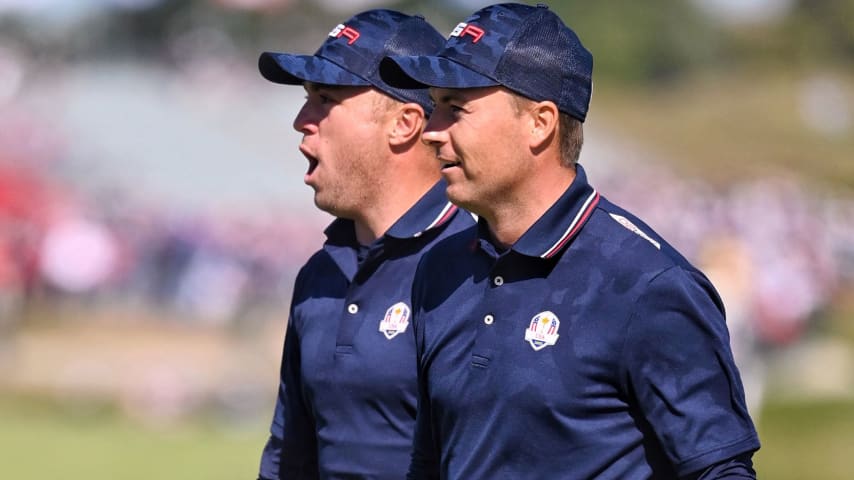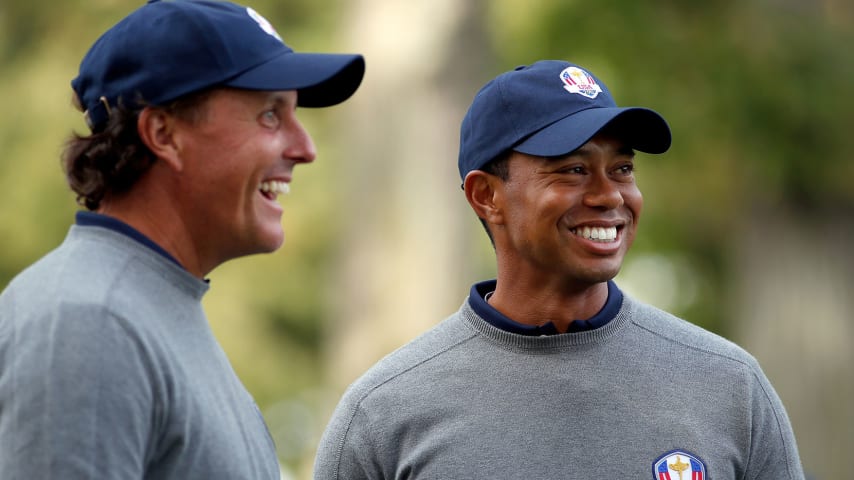Ryder Cup notebook: Collin Morikawa gives back injury all clear
10 Min Read


Best of 2020: Collin Morikawa bunker shots
SHEBOYGAN, Wis. – Two-time major winner Collin Morikawa says the back injury that hampered his FedExCup Playoffs run is behind him as he looks ahead to his Ryder Cup debut for the U.S. Team at Whistling Straits.
Fresh off winning the 2021 Open Championship at Royal St. George's in July, Morikawa pulled a muscle in his lower back during the first round of Olympic competition in Tokyo. The injury occurred on the 14th hole after he tried hitting out of “sticky rough” but he figured he could battle his way through it.
Despite the pain, he battled all the way to a T4 finish. A Sunday 63 saw him enter a seven-way playoff for the bronze medal that was won by C.T. Pan.
The Californian entered the FedExCup Playoffs as the No. 1 seed thanks to his two-win season but missed the cut at THE NORTHERN TRUST and was T63 in a 69-man field at the BMW Championship before shooting the second-worst 72-hole score among the 29 players at the TOUR Championship.
“It was just bad timing. The biggest thing I learned from those three weeks was to never play injured. I'm never going to do that again, no matter what it is,” Morikawa said. “It built bad habits into my golf swing. By the time the Playoffs had started at Liberty (National) I thought my back was feeling good, but I had just built in some really bad swing patterns, and that's what happens when you play with an injury.”
The 24-year-old says the rest between East Lake and the Ryder Cup have him back in the right physical condition.
“I'm 100% healthy. Knock on wood right now, but I'm feeling great,” he said. “Those three weeks I was just trying to figure out how do I hit it better because that's a big part of my game, trusting, knowing where the golf ball is going to go.
“It feels good. I was talking with Xander yesterday, and he looked at me, and he's like, You're back, and I was like, Yeah, I'm back. The cuts are back, and it's a good time to have that shot.”
DJ's experience important for U.S. Team
Dustin Johnson may have taken closer notice than most to a memo given to all players ahead of the Ryder Cup regarding the 1,012 bunkers on the course.
Johnson famously was penalized on the final hole of the 2010 PGA Championship for grounding his club in one of the many sandy areas that proliferate Whistling Straits, both in and outside the ropes. The two-shot ding cost him the a spot in the playoff between Bubba Watson and eventual winner Martin Kaymer.
“All areas of the course that were designed and built as bunkers (Rule 12) will be played as bunkers during the Ryder Cup,” read the notice. “Bunkers inside the gallery rope line will be raked each morning prior to play and touched up again between sessions. Rakes are provided for the caddies allowing bunkers to be smoothed as a courtesy to other players and for care of the course.
“During play, footprints, indentations, vehicular damage or uneven surfaces may develop. However, whether inside or outside the gallery rope line, relief without penalty is NOT allowed for interference by any of these alterations to the surface of the ground, whether or not smoothed.”
Johnson, at 37, is the eldest member of the U.S. Team by five years and is playing his fifth Ryder Cup. But the laconic former FedExCup champion wouldn’t elaborate on any role as a leader within the youngest U.S. Team in history.
“It's a little strange for me just that I've never been the oldest. I always felt like I was one of the younger guys on the team. Still feel that way, but obviously I'm, I guess, the veteran on the team really,” Johnson said.
“It's a role that I enjoy, but obviously with the guys on the team, all of them are very good player, so don't really have to do much. My role is to win as many matches as I can or just worry about my match that I'm playing in, help the team in any way that I can or that they need. So that's what I'm going to do.”
Poulter plots another Cup upset
Ian Poulter’s Ryder Cup efforts are the stuff of European legend with five wins from six Cups and a 14-6-2 personal record.
The Englishman is undefeated in Singles play (5-0-1) and has been formidable in Foursomes (5-2-0) and Four-ball (4-4-1) as well during his time on the team making him an easy choice for Padraig Harrington as a Captain’s Pick.
Poulter has also won the World Golf Championships – Dell Technologies Match Play and the European Tour’s match play event in the past, helping secure the nickname of the match play ninja.
“I hate losing. When you play match play, you know what you have to do when you tee up on the first hole. You can control a match. You can dictate a match. You can play certain shots to try and put your opponent under pressure,” Poulter said when trying to explain his success in the format.
“It's just a fun game of chess, to be honest, to enjoy what that means, that you're under pressure right from the get-go. It just doesn't happen in stroke play… it's back nine Sunday mentality every single time you tee it up.”
Despite the fact the U.S. has lost four of the last five Ryder Cups they start heavy favorites in the competition at Whistling Straits. The underdog tag is one Poulter and his team relish. He was the catalyst behind Europe’s stunning comeback at Medinah in 2012 and believes a win up the road in Wisconsin could be just as sweet.
“I guess everything is stacked against us. When you have that, when you can go in as underdogs, when you can turn the tide and actually come out victorious, it means a little bit more,” Poulter said.
“It's a great buzz (to win away from home). It's difficult from start to finish. It's hard. As much as we feel comfortable as a team, to know we're underdogs, to know that we have to play extra special this week to get the job done. It feels pretty rewarding at the end of the week if we can get it done.”
Wiesberger goes from press room to team room
Bernd Wiesberger is set to make history as the first Austrian to play in the Ryder Cup, a career long goal achieved for the 35-year-old who spent the last Cup behind a microphone moonlighting for the media.
A left wrist injury in 2018 derailed his attempts to make the 2018 European team in Paris for the now world No.63 and instead he was in attendance as a television analyst watching Europe secure a dominant 17.5-10.5 win. But he secured his place this time around at the 11th hour in the final qualifying event a few weeks ago.
“Last Ryder Cup in Paris I was part of German speaking TV and tried to give my sense as to what's going to be the outcome, so I was on that side of the press conference and trying to make sense of what's going to happen this week,” Wiesberger laughed in his first official press conference of the week at Whistling Straits.
“Something kind of fueled inside me (in Paris) and took it as motivation that once my injury was healed, to be part of one of these teams. I never really vocalized it or spoke about it too much, but it was definitely massive motivation for me.”
Like Viktor Hovland and his native Norway, Wiesberger is adding a new flag to European team history for Austria.
“Everybody is super excited in Austria. We have some great talent in Austrian golf. I think it was a little overdue for having an Austrian representing Europe in the Ryder Cup. I'm very proud that it's me,” he said.
“I'm absolutely certain that I won't be the last Austrian to represent Europe at the Ryder Cup. I've got a lot of messages, and I'm sure there will be tremendous support from home during the whole week.”
Schauffele defies family ties to rep U.S. Team
Xander Schauffele implored everyone at Whistling Straits to keep a close eye on his father during the contest with Europe this week.
Born in Germany, Stefan Schauffele has obvious ties to Europe and his son could have easily chosen to represent the opposition had he wanted to during his maturation as a junior golfer in San Diego.
But the recent Olympic Gold medal winner for the USA has no regrets hitching his wagon to the red, white and blue despite being the lone U.S. born member of his family.
During every round Schauffele plays on the PGA TOUR you can find his father walking along, taking it all in. A former Olympic hopeful himself as a decathlete, Stefan had that dream ripped away when he was struck by a drunk driver. He will be there again in Wisconsin, stalking the rope lines.
“I think my dad is just rooting for me. I don't think you'll catch him saying he's rooting for Europe at any point but let me know if he does,” Schauffele said with a grin.
“It's funny, I guess I almost stand alone in my family. My brother was born in Stuttgart, my dad was born in Stuttgart, my mom was born in Taiwan and grew up in Japan. International, as I like to say.
“I think I'm the only natural born citizen in my family, so I can say I'm proud to be an American. I was the only one born in the U.S. For that reason, I feel very American. I just feel like I've been exposed to a lot of other cultures so I understand them very well.”
Covid and injury contingencies explained
The Ryder Cup Captains’ Agreement spells out the rules of competition for the event when the U.S. and Europe go head-to-head. In a first there have been provisions added for a player who tests positive for COVID-19.
According to the Captains’ Agreement, any player who tests positive for Covid, even while playing a match, is immediately ineligible for the remainder of that match and the remainder of the Ryder Cup.
Team substitutions are permitted up until the teams are announced at the Opening Ceremony.
For the U.S. Team, that player will be replaced by a Captain’s pick.
For Europe, if the withdrawal is one of the four players qualified from the European Points List, he will be replaced by the fifth player from the European Points list. If that fifth player is already on the team from the World Points List, he will be deemed to have made the team from the European Points list and the replacement will be the next person from the World Points List.
If that fifth player from the European Points List was a Captain’s pick, he will be deemed to have qualified for the team through the European Points List and the replacement will be picked by the Captain.
If the withdrawal is one of the five players who qualified from the World Points List, he will be replaced by the next player not already on the team from the World Points List. If that player is a Captain’s pick, then he will be deemed to have qualified for the team through the World Points List and the replacement will be picked by the Captain.
If the withdrawal is one of the three Captain’s picks, then the Captain will pick the replacement.
After the Opening Ceremony, as not all players play in Foursomes or Four-ball, the Captain would select eight players for each session from 11 players instead of 12.
For the singles, it would be similar to the sealed envelope scenario which applies in the event of illness or injury. Team Captain’s place player names in an envelope and in the event of a withdrawal the player named is deemed to be drawn against the injured/ill player. Such matches would be deemed tied.
In terms of multiple players testing positive, either from one team or on both teams, while not speculating on precise numbers, the exact details of the scenario would be assessed by both organizations in order to determine its impact on the overall playing of the Ryder Cup.












